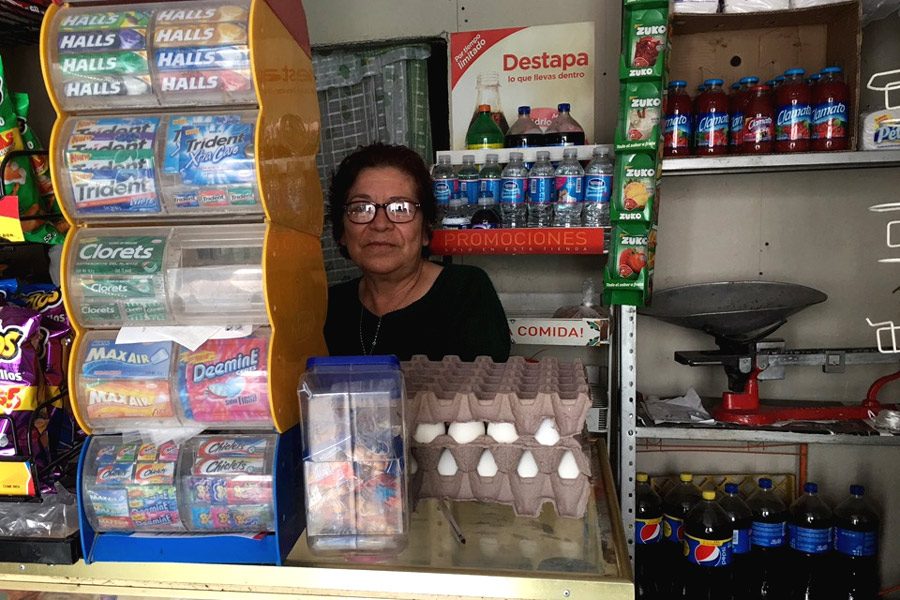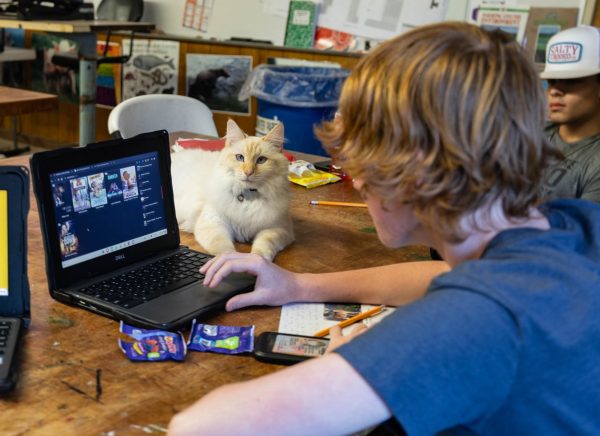Hidden in the shadows
Current and former undocumented immigrants share their stories
The mother of Félix Ramírez works a convenience stand. She has since returned to Mexico after her son was deported.
January 13, 2017
There’s nothing more heartbreaking than seeing your family being taken away from you and knowing that maybe you won’t see them in years or maybe never.
Silvia Alvarado was just 21 years old when she left her family in 1990 to come to America and be with her husband.
“The crossing process wasn’t bad. I took a 22 hour bus ride to the Juarez border with tons of strangers,“ Alvarado said. “Then I got in the front seat of a trailer truck. I hid under the glove compartment, and apparently no one saw me. After that I reached Dallas and met with my husband, he then took me to Kansas.”
Some people are more fortunate than others. Alvarado is lucky enough to have become a United States citizen not too long ago, but her sister, Angelica Valle, is still an illegal immigrant.
“I crossed the border in 1990 and came to live with my husband also,” Valle said. “I haven’t seen my parents since then and that makes me regret my decisions. I regret not turning myself in and being able to be with my parents and brothers and sisters.”
If they turn themselves in, then they’ll receive a punishment. They’ll have to write a apology for doing so and then the ICE [Immigration & Customs Enforcement] will decide whether to forgive them, but forgiveness is not a certainty.
“I’m scared of turning myself in till this day,” Valle said. “The punishment isn’t what scares me, it’s who I’m leaving for a year or so. I have a grandson who lives with me and he calls me ‘Angel’ because I’m his angel,” Valle said. “I don’t know what he or I would do if I was gone for a year, that’s something that keeps me up at night sometimes.”
They (an immigrant) can go back to their country but they cannot come back once they are there. Once an immigrant does cross back to their country they can ask for an apology, which is asking for forgiveness to immigration, but realistically, an immigrant will receive a punishment of 3 to 10 years, also known as the Three- and Ten-Year Bars. However, an immigrant’s son or daughter that is a U.S. citizen can ask for a residence for their parent. In Valle’s case, her son can ask for a residence for her.
“There’s nothing more scary than finding out that the ICE are in your town and are searching for people. If they ever find you then you won’t have to be in Mexico for a year, but you have to pretty much stay there,” Valle said. “It’s not that hard to find out when the immigration is in Texarkana because all the Mexicans talk and know each other, so the news spreads fast and everyone is hiding in their house for one to two days or until you hear they’re actually gone. I’ve actually hid in my house for a week because it was that bad. The immigration were everywhere in Texarkana, and so many people were thrown out of their homes and had to cross the border and walk from there.”
In some cases, immigrants who have been deported do not return. Hipolito Oro, 52, was deported by the ICE in 2001 and hasn’t gone back to the U.S. since then.
“The cause of my deportation was my wife,” Oro said. “A couple days before my deportation, I caught her cheating on me, so naturally I got mad and screamed at her. I didn’t lay a finger on her, but she said otherwise to the police. The police came to my house and took me to jail until the ICE came for me.”
After the ICE takes an immigrant across the border, they don’t care if the person has no home, no money or is missing a leg or arm; they only care if they cross and don’t come back. Oro was lucky enough to have money with him, so he went back to his hometown and began a tortilla business. Others have different circumstances.
“I was deported twice from the U.S.,” immigrant Félix Ramírez said. “The first time I was deported it was because I was selling illegal substances, and my punishment was staying in Mexico for 10 years. The second time I was deported was because I tried crossing before finishing my punishment. After the ICE crossed me, I had to walk back to Guanajuato because at the time I didn’t have my family’s approval nor did I have money to get a bus ticket.”
For every illegal immigrant, fear is ever-present when stepping out of their house.
“Fear is something I always have when I step out of my house,” Valle said. “I always treat my family as if this was the last day I’ll ever get to see them.”



















